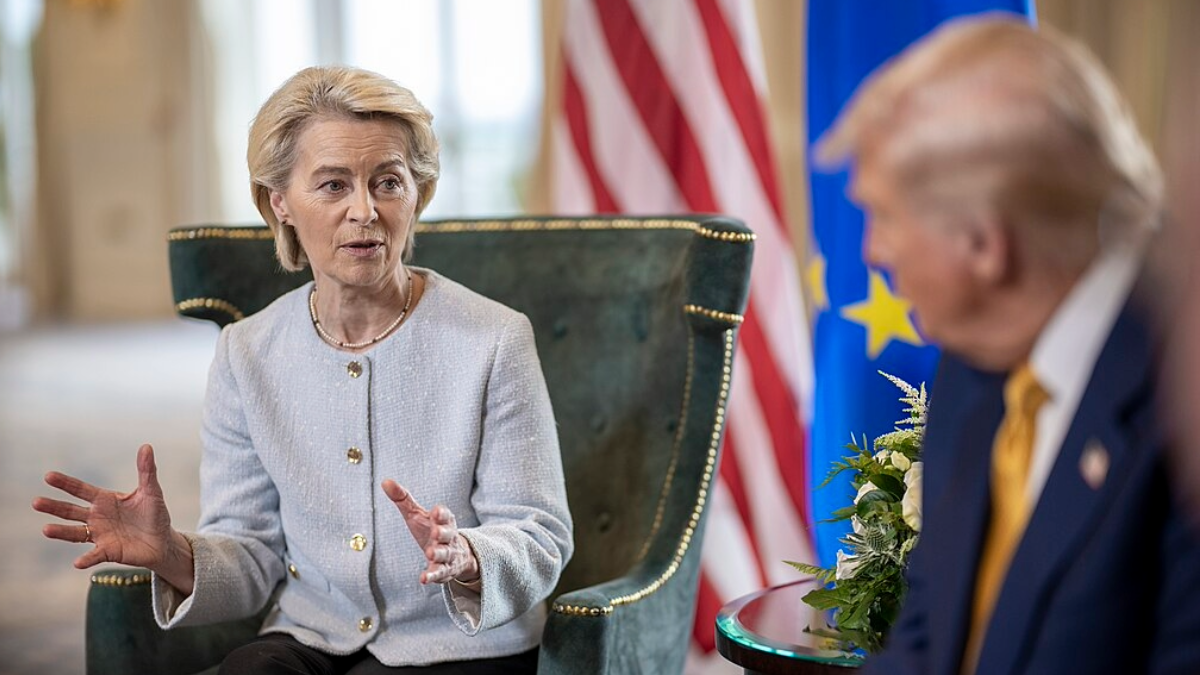Europe Cannot Wait to Fight Trump’s Assault on Democracy
Alexandra Geese / Aug 27, 2025
US President Donald Trump meeting with the President of the European Commission Ursula von der Leyen in Scotland, July 27, 2025. The White House, Public domain, via Wikimedia Commons.
The ink isn’t dry yet on the trade agreement between the EU and the US, which was formalized in a written statement on August 21, weeks after the deal was first announced. On August 25, it is already dead. With a post on Truth Social, US President Donald Trump announced additional tariffs for any country that enforces digital regulation or imposes taxes on US digital companies.
According to official statements, the European Union has maintained a strict stance on the implementation of Digital Services Act (DSA) and Digital Markets Act (DMA) regulations, despite recent delays in enforcement. Investigations into TikTok's role in the Romanian elections and Elon Musk's algorithmic meddling in favor of the far-right in the German elections are ongoing, many months after those elections created a new political reality. However, at least the Von der Leyen Commission has upheld the letter of the law. The DSA allows for transparency regarding moderation and algorithmic content management, users‘ rights in the event of takedown, and access for researchers in the case of the DSA. The DMA is designed to safeguard companies, including numerous US firms, against the exploitation of their dominant market positions by gatekeepers.
Trump's latest threat conveys three messages that Europe and the world should pay close attention to. First: It is evident that Trump is not a reliable partner when it comes to trade deals. No amount of flattery or appeasement will guarantee a favorable outcome in the long term. Secondly, US-based tech companies are exerting significant pressure on the US government to ensure that their interests are prioritized. Thirdly, Trump's objective—which is aligned with the interests of certain US technology companies—is to implement regime change in Europe.
The State Department articulated its European strategy in a recent Substack post titled "The Need for Civilizational Allies in Europe." Trade policy is not merely a means to alter the functioning of the US economy. It is a political strategy to place Trump's allies in positions of power. Brazil serves as a prime example of this phenomenon. Trump's decision to impose a 50% tariff on Brazilian goods was strategically designed to support his ally, Bolsonaro, who is currently facing legal proceedings in Brazil for attempting a coup. Europe should brace itself: Trump and his allies are relentless in their pursuit of their goals. Trump and his allies will not stop until they have overturned enough European governments to prevent the bloc’s platform legislation from being enforced. Social media companies, which can manipulate public opinion by amplifying far-right voices and suppressing those of progressives, play a decisive role in this political shift to the right.
Yet, not everything is lost. Once the moderate conservative party in power in Europe (EPP) recognizes that it is next on Trump's menu of parties to be replaced by more extremist politicians, Europe has three options to protect global democracy.
First, do not succumb to extortion. It is essential to enforce DSA and DMA in a meaningful and effective manner. It is necessary to clarify how virtually all platforms utilize algorithms to amplify outrage, anger, and fear, overriding users‘ explicit content choices. Those emotions serve to perpetuate the dissemination of disinformation and undermine trust in science, media, and governments.
On top of that, there are serious concerns about algorithms being twisted by platform owners like Elon Musk to boost divisive and outrageous content and suppress progressive and moderate voices. The DSA should be enforced to prevent these systemic risks. Algorithmic control over speech by platform owners is currently the biggest risk to freedom of speech. The DSA—if well-implemented—can address this concern. Implementing the DMA is essential to ensure that digital companies, excluding gatekeepers, have a genuine opportunity to compete. It is imperative to restore a free market of ideas, free from algorithmic censorship, and a free market of products and services, free from monopolies and anti-innovative market practices. It is imperative to support emerging social media platforms that ensure equitable access to voice for all users, without the implementation of opaque algorithmic processes or surveillance practices.
Secondly, establish strong relationships with those nations that share our commitment to freedom. Should Europe assume a leadership role and establish a coalition with Brazil, Canada, Taiwan, South Korea, India, Mexico, and numerous other nations to promote democratic principles in the digital age, it would significantly diminish President Trump's ability to wield influence through blackmail. If these countries can collectively demonstrate solidarity in case of unfair tariffs imposed with political aims, the free world can defend its democracy against Trump‘s imperialistic interference. It is essential to strengthen political and trade relations. And most importantly: The formation of a D20 coalition of countries (Brazilian Congressman Orlando Silva initially launched the D20 idea at the 2024 Cambridge Disinformation Summit) that don‘t accept the global rule of US or Chinese big tech companies. This coalition would cooperate and exchange on enforcing democratic legislation on technology companies.
Ensuring users' rights, preventing the undue suppression of content by algorithms, guaranteeing users‘ explicit preferences are respected, making sure everybody has a voice and can express their opinion without fear of hate or repression, and countering the exploitation of social media for illicit activities such as drug trafficking and human trafficking are all crucial responsibilities for democratic states. If they collaborate and demonstrate the potential for a truly free internet, Trump's ability to counter this may be limited.
Thirdly, build a European sovereign digital infrastructure. Now. Europe’s dependency on US technology is extremely concerning. From data centers and undersea cables to software, AI, and social media—Europe needs to build a complete stack (the Eurostack), and it needs to do it fast.
The good news is, Europe has plenty of talent and reputable companies. It lacks political will, the right mindset, and a financial setup to direct investment to local tech companies. While European opponents of European tech sovereignty still hide behind WTO rules and oppose any kind of public funding for digital infrastructure, Trump is awarding public contracts to tech companies. He recently took up government shares in tech companies like Intel, calling it a template “for an increased role of the US government in private companies.” This is not exactly textbook neoliberal economics. Europe needs to urgently leverage private and public investment and go all-in on building digital infrastructure. A broad alliance with the above-mentioned countries would help, since several of them have already implemented sovereign tech stacks (India) or are major producers (Taiwan).
It won’t be easy. Traditional industries, such as the automotive industry, are pushing for deals with the US administration at all costs. But the digital sector is no longer a ‘sector’ that can be neglected to help other industries. It’s the core of democracy and the core of the economy. Democracy will not survive if the tech oligarchs want it dead. And the European economy won’t survive without control over the digital products, services, and infrastructure that underpin all modern manufacturing and services. The sooner Europe wakes up, the better its chances of preserving democracy.
Authors
